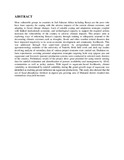Enhancing The Capacity Of Kenya On Climate Risk Reduction And Climate Change Adaptation For Sustainable Agricultural Productivity And Food Security.

View/
Date
24-09-10Author
Lukorito, C. B
Ouma, G O
Adipala, E
Tusiime, G
Majaliwa, J G M
Type
PresentationLanguage
enMetadata
Show full item recordAbstract
Most vulnerable groups in countries in Sub Saharan Africa including Kenya are the poor who have least capacity for coping with the adverse impacts of the current climate extremes, and adapting to future climate changes. Lack of suitable coping and adaptation strategies coupled with limited institutional, economic, and technological capacity to support the required actions increases the vulnerability of the country to adverse climatic impacts. This project aims at exploring ways of enhancing Kenya's capacity through training to adequately respond to the devastating climatic extremes such as droughts, floods and other weather related disasters that have impacted negatively to its socio-economic development and community livelihoods. This was addressed through four supervised projects by postgraduate meteorology and agrometeorology students of the university of Nairobi. Both field work and desk top studies involving analysis of secondary data of various project concerns were carried out. Decision on-farm experiments covering potential adaptation strategies targeting both crop (pigeon pea and sugarcane) and livestock (pasture) production systems were conducted in selected study districts of the country. Preliminary results of the project show great potential for using remote sensing data for rainfall estimation and identification of pasture availability and management by ASAL communities as well as policy makers. With regard to sugarcane-based livelihoods, climate variability as determined by rainfall variability during the grand growth stage of sugarcane was identified as exerting greater influence on sugarcane productivity. The study also showed that the use of basal phosphorus fertilizer in pigeon pea growing area of Makueni district resulted into tremendous crop yield increase.
Citation
Second RUFORUM Biennial Regional Conference on "Building capacity for food security in Africa", Entebbe, Uganda, 20-24 September 2010 2010 pp. 1459-1468Publisher
University of Nairobi
